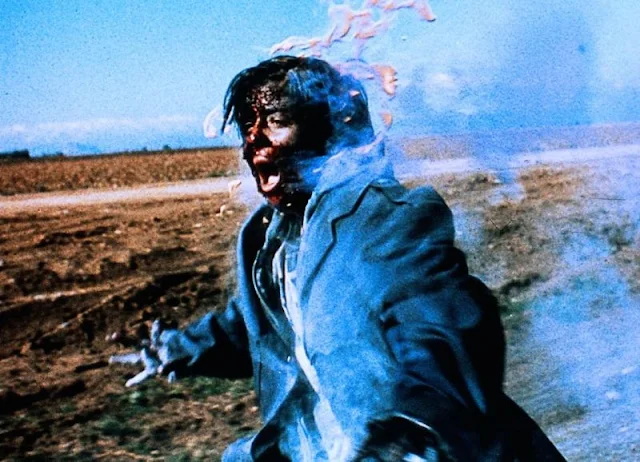A blog formerly known as Bookishness / By Charles Matthews
"Dazzled by so many and such marvelous inventions, the people of Macondo ... became indignant over the living images that the prosperous merchant Bruno Crespi projected in the theater with the lion-head ticket windows, for a character who had died and was buried in one film and for whose misfortune tears had been shed would reappear alive and transformed into an Arab in the next one. The audience, who had paid two cents apiece to share the difficulties of the actors, would not tolerate that outlandish fraud and they broke up the seats. The mayor, at the urging of Bruno Crespi, explained in a proclamation that the cinema was a machine of illusions that did not merit the emotional outbursts of the audience. With that discouraging explanation many ... decided not to return to the movies, considering that they already had too many troubles of their own to weep over the acted-out misfortunes of imaginary beings."--Gabriel García Márquez, One Hundred Years of Solitude
Search This Blog
Showing posts with label Stephen Altman. Show all posts
Showing posts with label Stephen Altman. Show all posts
Monday, November 25, 2019
Near Dark (Kathryn Bigelow, 1987)
Near Dark (Kathryn Bigelow, 1987)
Cast: Adrian Pasdar, Jenny Wright, Lance Henriksen, Bill Paxton, Jenette Goldstein, Tim Thomerson, Joshua John Miller, Marcie Leeds. Screenplay: Kathryn Bigelow, Eric Red. Cinematography: Adam Greenberg. Production design: Stephen Altman. Film editing: Howard E. Smith. Music: Tangerine Dream.
I didn't think I ever wanted to see another vampire movie. And after No Country for Old Men (Joel Coen, Ethan Coen, 2007) and Hell or High Water (David Mackenzie, 2016), I was feeling a little burned out on the neo-Western genre. So a film like Near Dark that combines both was a little out of my range of immediate interests. But Kathryn Bigelow's name drew me in, and it was also a chance to see a performance I had missed by one of my favorite actors, the late and very lamented Bill Paxton. I wasn't disappointed. Bigelow has a way of making even the most generic subjects interesting. She's a little like Hitchcock in her ability to keep you on edge and to create characters that make you root against your own interests. Her vampires are objectively a vicious, grungy lot, and yet you almost root for them when they're under siege, in danger of being forced into the lethal sunlight, just as you somehow sympathetically root for Hitchcock's villains like Norman Bates to get away with it. It's also a well-cast movie, with a young and very pretty Adrian Pasdar as the imperiled mortal, and Paxton doing his showboating best as the most flamboyant vampire. This was in a period when Bigelow was involved with James Cameron, so Paxton, Lance Henriksen, and Jenette Goldstein came over from the cast of his Aliens, released a year earlier and given a plug on a theater marquee in the background of one shot.
Friday, October 11, 2019
Cookie's Fortune (Robert Altman, 1999)
Cookie's Fortune (Robert Altman, 1999)
Cast: Charles S. Dutton, Glenn Close, Julianne Moore, Liv Tyler, Patricia Neal, Chris O'Donnell, Ned Beatty, Courtney B. Vance, Donald Moffat, Lyle Lovett, Danny Darst, Matt Malloy, Niecy Nash, Randall Mell, Rufus Thomas, Ruby Wilson. Screenplay: Anne Rapp. Cinematography: Toyomichi Kurita. Production design: Stephen Altman. Film editing: Abraham Lim. Music: David A. Stewart.
Cookie's Fortune is one of Robert Altman's lesser-known movies, but it's an eminently likable one, a comedy about that familiar literary trope, the dysfunctional Southern family. It's set in the picturesque small North Mississippi town of Holly Springs, which I know well because it was on the way from Oxford to Memphis back when there were no four-lane roads to travel on. In the film, it's a place with no apparent racial tensions: When a black man, Willis Richland (played by the great Charles S. Dutton), is arrested for the murder of elderly Jewel Mae "Cookie" Orcutt (a wonderful performance by Patricia Neal), the white sheriff refuses to believe he did it: "I've fished with him," he explains to the skeptical out-of-town forensics expert. Altman and screenwriter Anne Rapp simply choose not to make racial animosity a factor in their story, which is really about how difficult it is to keep secrets in a place as small and as nosy as Holly Springs and its like. Cookie's death is actually a suicide, but her niece Camille (Glenn Close), who discovers the body, chooses to cover it up -- actually eating the suicide note, which is not addressed to her -- because (a) the fact of suicide would cause a scandal in the town and (b) she stands to inherit as the next-of-kin to Cookie, assuming there's no will. (There is, but she doesn't find it in the cookie jar where it's hidden.) Camille enlists her rather slow-witted sister, Cora (Julianne Moore), in the cover-up. But suicide will out, as well as lots of other family secrets. All of this is taking place over Easter weekend, when Camille's production of Salome -- by Oscar Wilde and Camille Dixon, as the poster says -- is being staged in the local First Presbyterian Church, starring Cora in the title role. Cookie's Fortune is a charming film, carried along by a cast that Altman stands out of the way of and lets do their thing.
Subscribe to:
Comments (Atom)

















